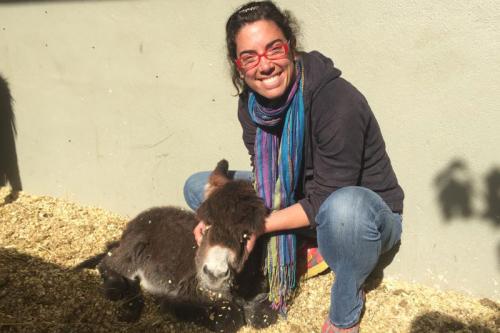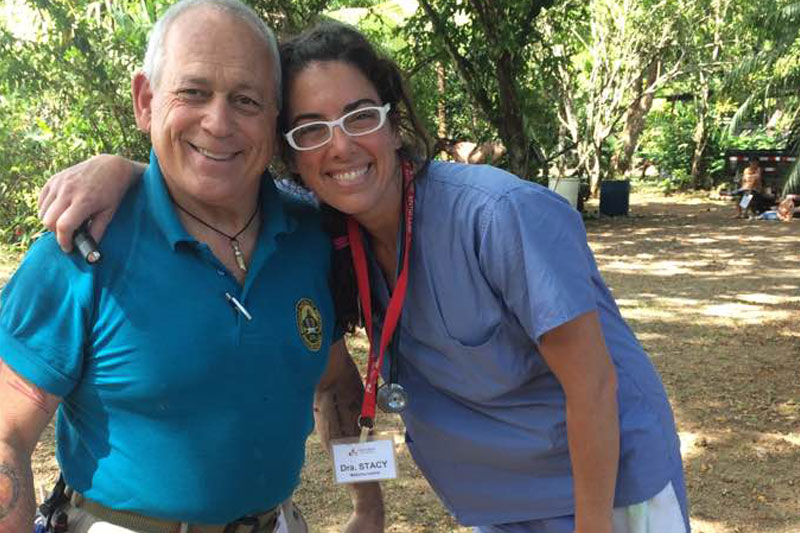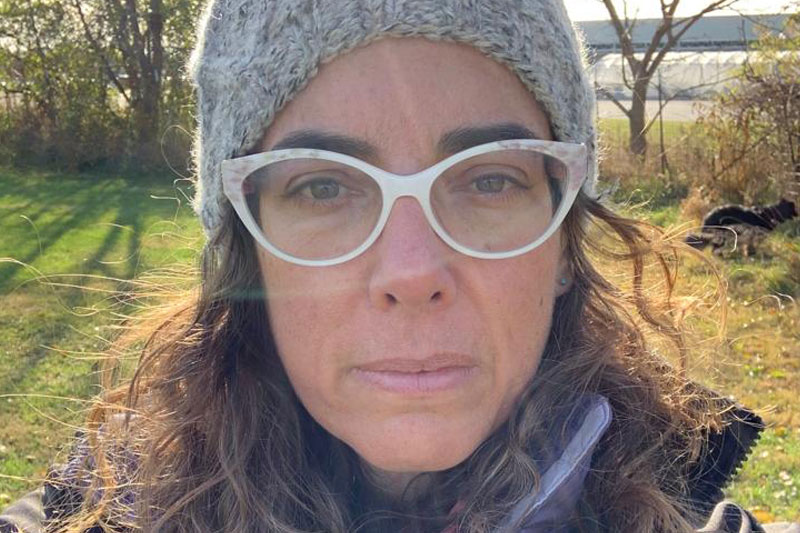Stacy Tinkler

Enthusiastic, dedicated, and inquisitive, Dr. Stacy Tinkler, DVM, MPH is a large animal veterinarian who has found a way to balance academic and international veterinary work. Stacy is an advocate for working equines, spending substantial time working with communities in Central and South America, helping build capacity for veterinary students and local community members in low resource areas to improve working equine health and welfare. Using a One Health approach, and collaborating with agronomists, crop and feed specialists, local veterinarians, students and animal science professionals, Stacy and her colleagues have developed a training program in Peru that is appropriate to the local context. Stacy’s dedication and enthusiasm for this type of work was so apparent during this interview, and we really appreciated her authenticity and vulnerability when discussing personal aspects of her life that have shaped her career and professional trajectory.
Veterinary School & Year Graduated: University of Minnesota, 2005
Additional Degree: M.P.H., University of Minnesota, 2014
Questions and Answers
- Tell me about your most challenging and rewarding veterinary jobs or work experiences.
- My most challenging and rewarding experience was working at the American Fondouk in Morocco, a working equid clinic providing free veterinary care. It was an intense position with lots of health and welfare challenges to combat every day. I loved working with Moroccan interns and vets and it was a very culturally immersive experience. I faced a lot of harassment in the streets as a western woman living and traveling alone but the environment was always warm and respectful within the hospital and the team was great. This position required me to use all of my veterinary and life skills. I gained a lot of One Health, cultural, and ethical insights. I’ve also taken several trips to Peru where the work focus has shifted from clinical service to supporting the local vet school. Being a part of that progression has been rewarding.
- What did you love about the position or experience?
-
I loved working with veterinary students in Peru. They were always trying to learn as much as possible. I also loved all the activities that involved the community and learning about the culture. We hosted a community outreach and education event in Peru for equine handlers which gained a huge attendance and interesting cultural insight.
- Tell me about your journey to get to that point in your life.
- I started vet school later in life and I think that helped give me perspective and a good idea of what I wanted to do in the long run. I got a dual DVM/MPH and tracked mixed-animal and loved both of those parts of vet school. I also went on three international service trips while in vet school that solidified my path in equine med. After vet school I completed an equine internship at a very busy practice. Following that I got a field service residency after a potential job didn't work out. The residency was brand new so there were a lot of bumps along the way and I learned a lot. I then transitioned into a large animal medicine residency for a couple of years focusing on equines, small and large ruminants, camelids, and pigs. I was having some personal life challenges during the residency and wanted to take things one year at a time once I finished. I took a job at Purdue as a research fellow for a year and then was hired as an equine ambulatory clinician while also spending about half of my time teaching vet students. Once I got into the groove of those jobs I started doing international trips again.
- As a veterinary student, did you ever imagine yourself taking this journey and having these professional experiences?
- Once I went on the international trips as a vet student, I was like, “This is what I'm going to do, I'm going to somehow find a way to do this.” I didn't know how, but I knew I was going to find a way to incorporate this international work into my life. When I started my internal medicine residency, everyone was confused, because they thought I just wanted to do international work, and I did. I just thought I needed more of a background. That's why I did a residency. I didn't have any grandiose visions of being an academic whiz, I just really felt like I wanted and needed to learn more.
- In retrospect, what do you wish you’d known as a veterinary student or early in your career?
- Don't limit yourself. Open yourself up to possibilities. It’s so easy to limit yourself and it can be difficult staying open to possibilities unless you get out into the world and understand what's out there, see what problems there are, see how things are different for women, for people of different races, for kids, all of it. All of that life experience, the loneliness, and the fear when you're abroad can be difficult, but the grit and the resilience that you develop, and the cultural awareness is so huge. If you want to do international work, what I would tell you is to not get hung up on tracking. Stay as broad as possible and learn as much as you can about every species because there are huge international opportunities in all areas. Small animal, large animal, public health, One Health, wildlife, there are opportunities for all of it.
- Would you have changed anything about your time in veterinary school?
-
No, I loved vet school. I had some difficulties getting into vet school because of my performance in college. In one interview I asked the interviewers how long I was going to be living in the shadow of my college grades from 10 years before. It was a good exercise in standing up for myself.
- Would you have changed anything about your career path since graduating?
- Try not to regret anything as your past experiences shape you. I’m not sure if my residency was worth it, it was really tough. But overall, I wouldn't change it.
- Did you have any mentors or role models along the way that helped or inspired you? Please provide an example of how they helped you or what qualities they had that made them a good mentor? How did you find them?
- One of my mentors is a private practitioner in California involved with RAVS. He took me on my first trip to Peru. He was kind, adventurous, patient and a big part of how I ended up where I am. Our bond surrounds acknowledgement of privilege and desire to give back as much as we can.
- Tell me about any pivotal moments or key turning points that shaped your career.
- It was a little hard to commit to one species after tracking mixed-animal, but ultimately committing to equine was a pivotal point in my career. I was worried about working on show and racehorses as I wasn't sure if I could make an income from only treating backyard horses. A successful equine practitioner I knew told me I could probably do it, so I committed to equine medicine. This choice allowed me to forge a path that involves part-time international equine volunteer practice.
- Tell me about one or two challenges, setbacks, or obstacles that you faced along the way on your professional journey. How did you address those?
- Near the end of my second residency, I got diagnosed with Grave’s disease, which was partially stress-induced. I was also going through a marital separation at this time. It was all very hard and stressful; I had major burnout, clinical depression, insomnia. These life events, on top of the residency, were more than I could bear and I sought more help. I was started on antidepressants and went to therapy and was able to get through my residency. When I transitioned to a more normal work schedule, as a research fellow with some locum work, I was able to sleep more, get myself back on track and wean off of my meds.
- What was the most important lesson you learned as a veterinarian, and still remember today, and would want to tell vet students about?
- You need time to cultivate your relationships and time to take care of yourself. You need time to be in the world. If you don't have that, I think everything else falls apart. Having said that, you also have to be willing to sacrifice some things to a certain extent in order to do this job and it is important to understand this and find this balance. Focusing on my relationships, focusing on taking care of myself so I can be the best and bring the best of myself to my work, to my family, to my friends, and to students is the goal now. Those are the big lessons as I wasn’t very good at this earlier on. I lost myself completely to the job. The life skill part, taking time to really tap into all of the other skills that we have, or talents that we have, is just as important (if not more so) as who we are clinically. We can use all of these skills in so many ways. We can use our degrees in so many ways. Life skills like teamwork, and being a good listener, are hugely important to your clients and colleagues. On the flip side, learning how to set really good boundaries with those same people is also going to be important to your success and simultaneously, your self-care.
Also, be open to experiences, be open to different ways of using your degree, and don't feel trapped by one path. Do not forget about animal welfare because owners are going to put you in difficult situations and ask you to do very questionable, ethically challenging things that benefit them or some other human, and are absolutely putting the animal’s welfare at risk or minimizing it in some way. Remember that we take an oath to do no harm. We are stewards of animals. We have got to be better about taking care of the welfare of animals and reminding people about their sentience and about their right to be here and what a good life for them looks like. It can be tricky to navigate and I think we need to be way, way better about it. - What’s been the biggest highlight of your career so far?
- Working with the Fondouk in Morocco was a really great position as it challenged me in every way, personal and professional. Also, my volunteer work in Peru, specifically a huge community education event, and the huge cultural insight that we gained was such an impactful experience. We were working with people who relied on horse-guided ecotourism for their livelihood and while there, we watched the younger generation of Peruvian vet students we were working with sharing and translating their newfound equine knowledge from Spanish to Quechua to teach the attendees and essentially running the education event. It doesn’t get any better than that as an educator.
- Is there anything else you’d like to tell me that you think would be helpful or relevant to veterinary students or early-career veterinarians?
-
Be patient, things take a while. Even for how hard you feel like you're working now, there’s not going to be a reward overnight. You need to work hard, you need to show interest, you need to really commit and learn and show up and be someone that people can count on as a productive, valuable team member. I think that's how you get somewhere. Success is not going to come immediately. There’s going to be a certain amount of sacrifice that you’ve got to be willing to make. Coming to terms with that and figuring out what that looks like for you is really important, and it's going to be different for everybody. I think veterinarians are the unsung heroes of the world. I really do. Nobody really knows how to tap into all of our skills and we're not appreciated as much as we should be.


